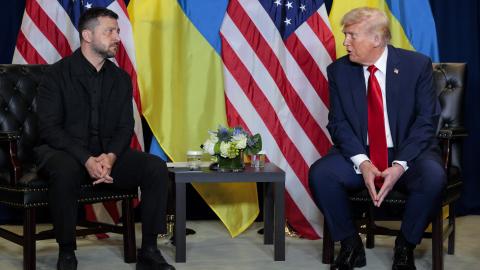The United Nations' annual September meeting is usually among the most prominent nonevents of the year, but Donald Trump made this latest gabfest notable. Some parts of his speech drew gasps, such as his asking, "what is the purpose of the United Nations?" and telling proponents of open borders that "your countries are going to hell." But his work on the sidelines made the most news.
Shortly after his speech, Trump wrote, "I think Ukraine, with the support of the European Union, is in a position to fight and WIN all of Ukraine back in its original form." His meeting with Ukrainian president Volodymyr Zelensky was cordial, and many commentators concluded Trump had given up on aligning with Russia and was tacking back to Europe. That's not quite right. He has never been interested in ditching the Europeans—he wants them to step up.
Trump still desires a productive relationship with Russia, and he would rather have Moscow focus on threats emanating from Beijing than from Washington. As he wrote at the end of his Ukraine post, "I wish both Countries well." But he also remarked on Tuesday, "of the seven wars that I stopped, I thought that [Ukraine] would be the easiest because of my relationship with President Putin." "Unfortunately," he continued, "that relationship didn't mean anything." His peace efforts have sputtered out, and the war that he regards with justifiable horror rages on.
He has warmed to Ukraine, though. At the beginning of his term, the country brought up bad memories for Trump, who made clear in the February Oval Office fiasco with Zelensky that the first-term accusations of collusion with Russia and impeachment were sore points. But since then, Zelensky's charm offensive and receptiveness to Trump's peace proposals have made a good impression in the White House.
Ukraine is also on a more solid footing with the broader Republican Party. A Vandenberg Coalition poll this summer found around three-quarters of Trump voters see Russia as a threat and support additional sanctions. The Iran strike emasculated and demoralized Ukraine's GOP critics, who almost entirely overlap with the anti-Israel caucus. Trump's base is enthused neither by long wars to defend foreign democracies nor by the Europeans who offer little more than a wagging finger and an open palm, but they do not want America's enemies to advance further either.
Trump thinks he's found a solution to Ukraine that satisfies his and his party's goals: Make the Europeans pay to defend their neighborhood, including Ukraine. As he wrote this week, "With time, patience, and the financial support of Europe and, in particular, NATO," Ukraine should be able to regain all the territory Russia has seized since 2014." America's role? "We will continue to supply weapons to NATO for NATO to do what they want with them."
This inverts the normal formula American presidents have followed since the end of the Cold War. They have usually needed to assemble coalitions to accomplish their goals. Trump has told the Europeans, "I am ready to do major Sanctions on Russia when all NATO Nations have agreed, and started, to do the same thing, and when all NATO Nations STOP BUYING OIL FROM RUSSIA… I am ready to 'go' when you are. Just say when?" He also wants them to tariff China for aiding Russia's war effort and has publicly encouraged NATO members to shoot down the Russian aircraft that have repeatedly violated their airspace.
Unlike during his first term, Trump has willing partners. Germany's Friedrich Merz is a significant upgrade over Angela Merkel. And if Viktor Orbán loses his reelection next April, Hungary will likely stop blocking European action on Russia.
But there are significant risks. Barack Obama's "leading from behind" strategy depended on the Europeans stepping up, and it ended in a bloodbath in Libya. Polish foreign minister Radosław Sikorski recently admitted that European security guarantees for Ukraine lack credibility. Polish president Donald Tusk laments the "promise of reduced U.S. involvement and a shift of responsibility for ending the war to Europe" emanating from Trump. The Poles are among the most sensitive to the threat from their Russian neighbors, and their sense of alarm is growing.
Russia's economy is in trouble, but time may not be on Ukraine's side. Pro-Russian and anti-American parties led the polls in France and Germany even before the National Assembly ousted France's prime minister earlier this month. If they prevail, America's position in Europe will worsen.
Trump's views, like the fortunes of war, are changeable and turbulent. His willingness to aid Europe will rise or fall in tandem with the Europeans' willingness to help themselves. For his plan to succeed and for Europe to achieve peace, America's allies need to change facts on the ground, not issue new statements at conferences.




















